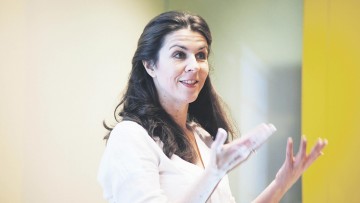Q. Does every business need to be online?
A. Yes. A website is your window to the world, whether that world is trade in your local area or with international markets. When so many customers are online, your business has to be there too.
Q. How do I make a website?
A. The first thing to do is buy a domain name. This will secure your identity online and you will be able to use it as leverage, even before you build your website. For starters, it will give you a professional-looking e-mail address (myname@mycompany.com). Research by Verisign1 reveals 93 per cent of small businesses say branded e-mails make them look more credible.
You don’t even have to build a website at the purchased domain, rather you can redirect potential customers to your shops, whether they be Etsy, eBay or Notonthehighstreet.com, or a profile on social media platforms, such as Facebook, Instagram and so on. This approach will build your experience.
Pretty soon you’ll want your own website. This lets you control the branding, the content, how people pay – everything, in fact. You can run your website in parallel with your marketplace shops, but with unlimited potential, which in turn could dominate your sales.
Template tools, such as Moonfruit, Squarespace and Wix.com, let you build a website with no coding. Just click, drag, and publish. Hey presto. It’s done.
At enterprisenation.com we are big believers in the power of .com. A .com domain delivers trust in your brand and it is internationally recognised from the start
Template websites cost on average £20 a month, and for that the template provider makes sure your website stays current and live.
The most ambitious step to owning your own website is to have a developer build a site for you. The secret here is to write a solid brief, so there’s no confusion, on how the site should look and perform. Find developers on the Enterprise Nation marketplace (enterprisenation.com/marketplace), and look for agencies with high ratings and reviews from previous clients.
Q. I’m not good with computers – will that be a problem?
A. No. If you decide to go online through social media platforms or template site-builders, you simply need to know how to navigate to these sites and they make the rest as easy as possible. If technology isn’t your greatest strength, surround yourself with people who do understand it. Through our Go and Grow Online campaign, we offer lots of content and events to match businesses with experts in all topics connected to setting up and making the most of technology.
Q. What if I need to update my site with new pictures and words?
A. If you have gone for the option of working with a template website, which is what we recommend for businesses starting out, then adding pictures and words is straightforward. You simply upload and then click and drag to get everything in the right place.
Q. Is it expensive?
A. No. Starting on social media is free and, with a template website, there are options ranging from free to prices going up to an average of £20 a month.
Q. Do I need to be a .com?
A. At enterprisenation.com we are big believers in the power of .com. A .com domain delivers trust in your brand and it is internationally recognised from the start. This is what every small business wants, making .com their preferred domain.
Q. Can the internet help me export?
A. Having an online presence opens you up to international trade and new opportunities. There are 1.2 billion people online across the globe, and many of them are looking for products and services that say Made in Britain. At Enterprise Nation, we have literally seen businesses start online on a Monday and sell to the world by Wednesday. An online presence immediately opens you up to any customer with an internet connection.
A .com e-mail address is vital for exports. Foreign buyers may be put off by a regional name, such as .co.uk or .london. A .com suggests global reach.
You can also use tech tools to make the export process easier, such as adding PayPal to your website to accept currencies from across the globe, and a support service on your site, such as Zendesk, so international customers can make contact and ask questions when you’re sleeping.
Q. What is SEO?
A. SEO stands for search engine optimisation and this is the process you go through to get seen on the web. It involves steps such as being active on social media, including Twitter, Facebook and Instagram, linking to and from quality websites, blogging websites your customers may visit, as well as uploading video clips to YouTube and keeping your own site fresh with content that includes words your potential customers will be searching for. Take these steps and your site will have better search potential for your customers.
Q. Fraud is a concern – will my website be secure?
A. When it comes to accepting payment on your site, use recognised brands, such as Stripe, PayPal or Worldpay. Be sure to change passwords on a regular basis and keep company data in the cloud and backed up so there is no fear of losing customer e-mails and accounts. Opting for a template website means you get a site with anti-fraud measures built in so you can focus on building your business.
Q. I want to get started – what is my first step?
A. Buy a domain. Create a social media presence. And then set about building a website using a template builder. Get promoting and, before you know it, your home on the web will be attracting visitors from places you never imagined. If you want to learn more about how to succeed online, visit the resource centre at start-online-with.com.
